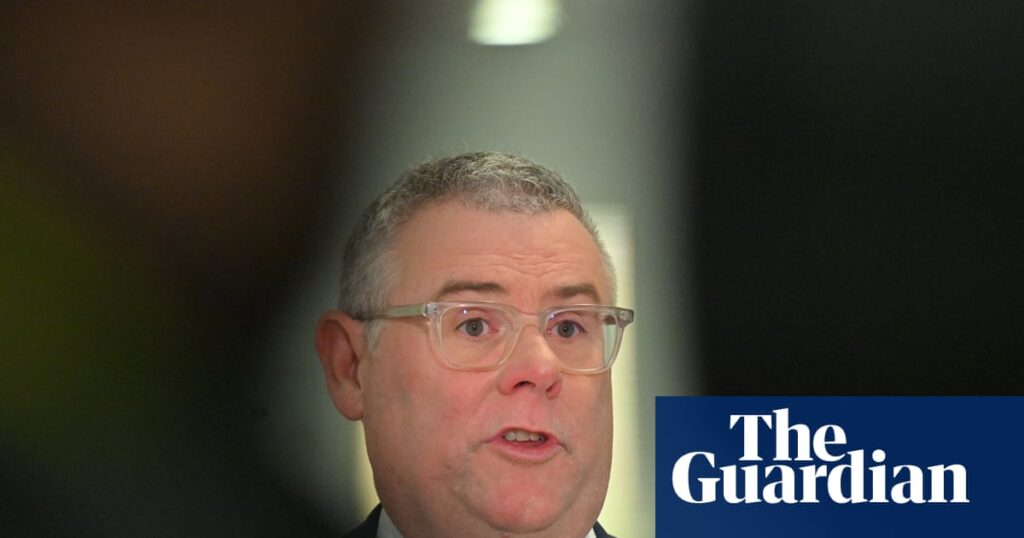Matt Kean has scolded the federal Coalition for “playing politics rather than acting in the national interest” on new nature laws, adding to the political and industry pressure on Sussan Ley to strike a deal with Labor.
The former New South Wales Liberal treasurer and Labor-appointed chair of the Climate Change Authority sent the message to his party colleagues ahead of Labor’s introduction on Thursday of a 1,400-page bill to overhaul the Environment Protection and Biodiversity Conservation (EPBC) Act.
Meanwhile, the environment minister, Murray Watt, faces pressure in his own ranks after his former cabinet colleague Ed Husic sounded the alarm about a proposed new power that would allow the minister to approve a project in breach of nature laws if it was in the “national interest”.
Watt will argue the case for the laws to pass quickly in a speech to the National Press Club, to be delivered exactly five years after Graeme Samuel handed his scathing review of the EPBC Act to then minister Sussan Ley.
“With the hyper-partisan atmosphere of an election campaign behind us, now is the best opportunity to pass a balanced set of laws, in the spirit of the Samuel review, that are firmly in the national interest,” Watt will say in the speech on Thursday.
“Put simply, it’s now or never.”
The government wants to pass the legislation before Christmas, proposing a 25-day Senate inquiry that would report back just in time for the bill to be rushed through before parliament rises for the year on 27 November.
Neither the Coalition or the Greens support the bill in its current form, meaning Labor will need to offer concessions to avoid the reforms collapsing for a second time in 12 months.
The opposition wants several changes to the draft bill – including tweaks to a new “unacceptable impact” test that would block projects and the removal of a requirement for big-polluting projects to disclose projected greenhouse gas emissions as part of the application process.
Sign up: AU Breaking News email
“The current draft extracts that we’ve seen paint a very grim picture for jobs, investment and productivity in our country,” the shadow environment minister, Angie Bell, said on Wednesday.
The Business Council of Australia shares similar concerns about the bill but is lobbying Ley to reach a deal with Labor, which would sideline the Greens.
Kean, arguably the most high-profile pro-nature Liberal in the country, appealed to the Coalition to soften their resistance and support the reforms.
“It’s obviously up to the government to resolve the passage of any legislation. However, with so much riding on it, you’d have to expect those true to their conservation values would find a way forward, and soon,” Kean told Guardian Australia.
“Given the business community is crying out for certainty and the recommendations are from a report commissioned by the Liberal party, it’s disappointing to see the conservatives playing politics rather than acting in the national interest.”
With the government open to addressing some of the Liberals’ concerns in order to land a deal, pro-environment Labor MPs are warning against watering down the bill.
after newsletter promotion
“This is a good law for the environment, for business and for the community,” said Jerome Laxale, a Labor MP. “What I don’t want to see is the law gutted in the Senate.”
The Greens are adamant the bill is too pro-business and cannot be supported without measures to address the climate impact of projects or to protect native forests.
Watt has already ruled out a “climate trigger”, and the bill will not remove a native forest logging exemption under the EPBC Act, leaving Labor well short of satisfying the Greens’ demands.
Other parts of the legislation have sparked alarm among environmentalists, including provisions to encourage the states to sign agreements with the commonwealth that could allow them to assess and approve projects under the new national environment standards.
The extent of the powers devolved to a particular state would depend on the deal struck with the commonwealth, according to senior government sources.
There is also widespread concern about a new “national interest” exemption that would allow the minister to greenlight a project in breach of national environmental standards.
Husic was concerned with how the power would be wielded under a future Coalition minister, airing reservations in Labor’s closed-door caucus meeting on Tuesday and publicly on ABC TV on Wednesday afternoon.
Watt has insisted the power would only be used “rarely” and not on fossil projects.


